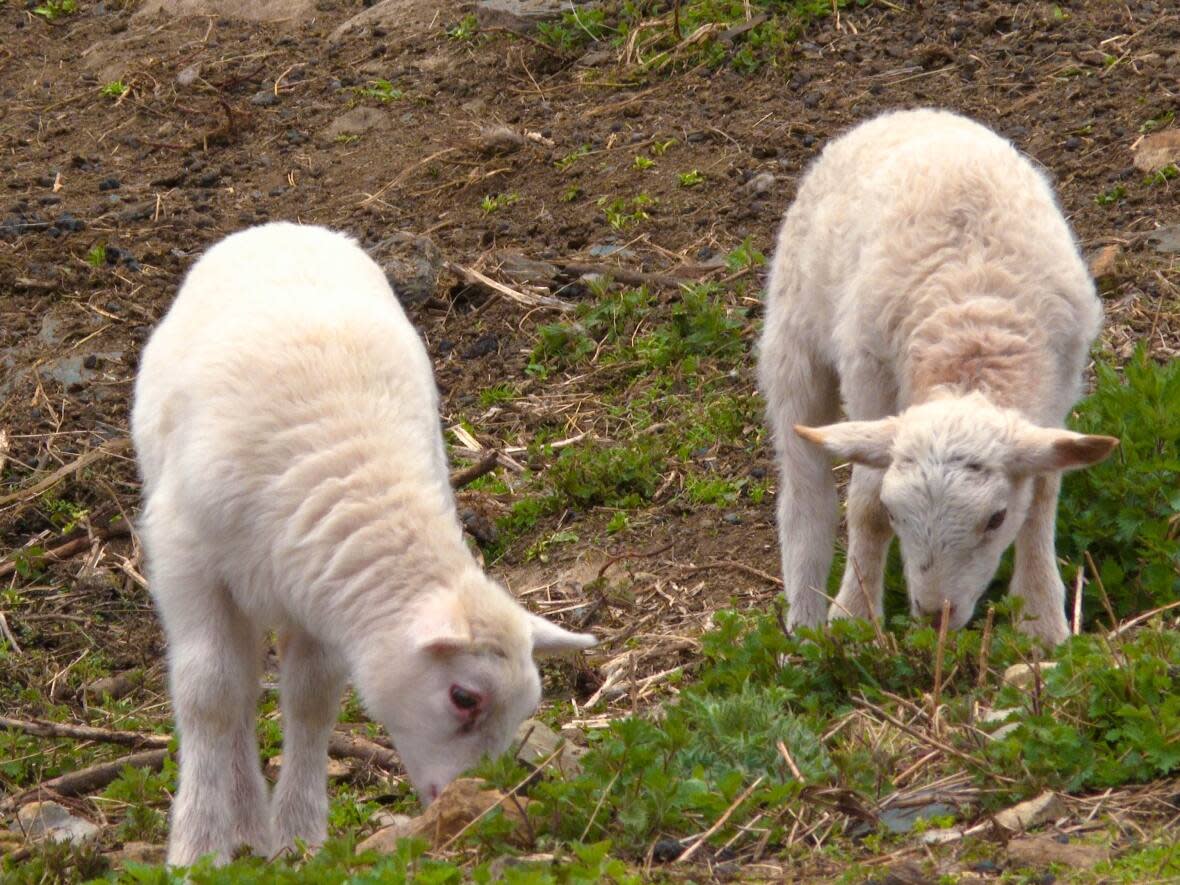Summerford residents continue protests over animal removal order


The animals are staying, says Frank Brown, and his land will continue to have livestock, just as it has for the past 150 years.
The Summerford, N.L. man is one of three residents who were issued a removal order by the town back in April to take animals off their land.
Brown is the owner of Larissa's Hatchery, which he operates on his family land in Summerford. He keeps about 100 sheep there, 10 goats, turkeys, a rooster, hens, a rescue donkey and two dogs to guard the others.
The farm is how Brown makes his living, he said, following an injury that forced him out of the fishery about five years ago.
"This is our livelihood; we make a living at this," he said. "There's nothing hurting nobody. None of the neighbours are complaining."

His land is tucked behind his home, and not visible from the road. No one lives behind him.
The animals are not there yearlong. He takes them to a 65-acre pasture outside town to graze from the first of June to the onset of winter, usually in December.
"I'm a commercial farmer. I've got all the registration and everything for my farm, I've got an environmentally friendly plan [at] this address," he said. "I've had animals throughout all my life.... And dad had animals and grandfather had animals, right on through to the first settlers here in Summerford."
When Brown was issued the order to remove his animals and shelters, it wasn't his first run-in with the town. About 10 years ago, he says the town came onto his property while he was away and dug up his waterline. The intention, he said, was to turn off the water as he was in arrears with his taxes. There was no curb-stop there when they finished the work, and the water was never turned off.

Since that time, he says he has paid some, but has not kept up on paying his taxes annually.
"I've been in to pay taxes over the years, and I said to [the clerk], 'I want a receipt for this year's taxes.' And she said, no, it goes back to the arrears. So I refuse to pay it cause if I pays, it goes back to the arrears, then they're still harassing you."
Now, with the threat of having his water being cut, he's digging in. And, he says the animals wouldn't survive without a water source.
"If they turns off the water to this property, you're going to thirst out 120-plus animals and animal cruelty charges are per animal, I was told," he said. "Where's it going to stop to? These rural towns of Newfoundland and Labrador … this is what this revolved around — farming or fishing."
He and the two others affected by the council order are appealing the decision.

Mayor Kevin Barnes and town manager Holly Anstey refused an interview.
Anstey said the town plan, adopted in 1998, prevents people from keeping animals — beyond household pets — in a residential area.
She said the issue came to light after the town experienced some water leaks over the winter. Council's decision is laid out in the minutes of the public meeting, she said.
In those minutes, the orders state that animals and structures have to be removed.
A separate order states that Brown's water line be removed and sewer line capped for his failure to pay taxes and for "illegally hooking into the town line."
The motions were carried unanimously.

However, since that time, three councillors have resigned. One of those is Julia Hawkins, the owner of Sparks, the Shetland pony which was also ordered to be removed. Hawkins says she wasn't available for an interview this week, but told CBC's Newfoundland Morning on May 15 it would be devastating to have her family pet taken away.
The frustration in dealing with the town is widespread.
Katie Anstey was asked to remove chickens from her property in 2022, she said, and reluctantly, she followed the orders.
Since the issue has arisen again, she's joined protests held outside the town hall with other residents voicing their displeasure with this issue, and how the town is run.
"It hit me greatly last year. We felt extremely harassed and victimized by having town employees coming on to our land and taking pictures without our permission," Katie said. "I think everybody should be able to have a right to have what they want on their own land, especially if they're going to do it right, if they're going to open up their animals and take care of them properly. I think you should be allowed to provide for your family."

Growing up in Summerford, Katie said her family had a horse, some pigs and other animals on the family land in town. She wants to return to that lifestyle.
"We're trying to create a more sustainable lifestyle, a more organic lifestyle for us and our family and for others around," she said. "When we had our chickens, we used to provide eggs not only for ourselves, but for our parents and grandparents."

For Brown, there's no giving in. He says she has the support of the farming community and local residents in fighting this order.
"My animals are here to stay," he said. "If they wants my animals taken out of this, if they wants to come out and shoot me or whatever you got to do, [that's] the only way they're going to take them — you got to drag them out over my dead body."
Residents, meanwhile, plan to keep protesting in front of the town hall.


